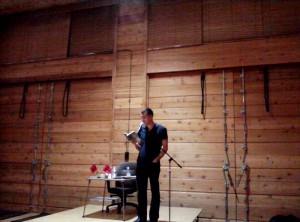
I have never thought of readings as anything other than inevitable. They are always offered as proof of my way of hearing or listening. On occasion I have produced and tailored pieces with an upcoming reading in mind, but I've never planned much in the way of “performance.” I've always identified with Tom Raworth's description of his reading style: “absolute hedonist—read the word, read the next word.” It continues to be a revealing process even as I negotiate the most abstract turns and peaks of my writing. It is revealing in its intensity.
I sometimes feel I am attempting to fend off my own audience, separating myself by any means, desperately throwing the material words out in front, sort of sacrificing them. I think of a victim being pursued in a horror film: you slam the door, barricade it, and litter your path with anything you pass by, always moving toward escape and guarding the heart. Once, talking with Eileen Myles, I used the word "hinges" in relation to how poems are kept together. She said quickly that she had "handles" in hers—they rise to the surface, always making themselves known a bit in advance. If you don't hit a certain word with the right timing, either the words underneath or those preceding it might cave in on you.
A reading reveals how much dimension you bring to the language, a testament to the effectiveness (and sometimes complexity) of its patterning, I often feel like a broke composer forced to arrange my own work for orchestra. Years and years of this reality have given me the wherewithal to recognize which words work as arches, flagstones, dams, etc.
My ideal in reading is to bring about a fountain-like effect. There are places in which a line runs exceptionally long and must be gathered up (in song, what they call the bridge) until it feels taut again and you can coast down that for a while. There is at least one hill in each of my poems. I read them as they are laid out on the page (like a score), but the indeterminate factor—the spaces between intention are what keep me interested. That's why I never bother to “practice” a reading anymore.
I get annoyed when I feel a poet is lingering too long over his or her words, swishing them around and spitting them back out, or speaking to the audience with implied question marks as if we were kindergartners. I have encountered this with some regularity and it's often given a pass as being “theatrical.” When I find a reading to be void of any rhythmic stimulation or over-rehearsed, I tend to wish I were alone in my room with the actual book or manuscript, trying to make it useful in my own voice.
My own reading style was formed by the pleasure I derived from listening to my favorite poets read their works. Some recordings I listened to like favorite songs, on endless repeat. One cassette tape in particular that I wore out was a reading of Ted Berrigan and Alice Notley at the Naropa Institute in 1976. This must have been shortly after the publication of their books Red Wagon and Alice Ordered Me to be Made on The Yellow Press.
I admired Ted's style for never seeming to be in a rush. He could offer warmth and spaciousness even in his shortest poems. The voice is a bit worn, but any trace of melancholy that lies in the actual content of the poetry is transformed by the music gained in his reading. I've often felt a similar sensation listening to recordings of John Wieners. On the flip side, Alice Notley's style has always seemed somewhat frantic, pruning language—nouns in particular are lopped off rather joyfully. It is not a quality of nervousness (which tends to scatter the line), but rather, a binding tension. Or as Ted himself once wrote, “Wind giving presence to fragments.”
Among my contemporaries, I have recently enjoyed readings by Jason Morris, Alli Warren, Patrick Dunagan, Lindsay Boldt, Julien Poirier, Evan Kennedy, Arlo Quint and Anelise Chen. I've been giving readings since 1999, and it occurs to me now how much restraint I've shown in terms of my approach. I always fantasize about just getting up and talking, as if I were between poems for the entire reading, giving endlessly happy answers to unasked questions.
Poet Cedar Sigo was raised on the Suquamish reservation near Seattle, Washington, and home schooled ...
Read Full Biography

